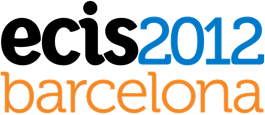Barcelona on June 10-13, 2012ESADE, Barcelona, Spain



the 20th European Conference on Information Systems



the 20th European Conference on Information Systems
SPONSORED BY: Special Interest Group: Adoption and Diffusion of Information Technology (SIGADIT)
Prof. Michael D. Williams School of Business & Economics, Swansea University, Swansea, UK m.d.williams@swansea.ac.uk
Dr. Yogesh Kumar Dwivedi School of Business & Economics, Swansea University, Swansea, UK y.k.dwivedi@swansea.ac.uk
Dr. Anand Jeyaraj Raj Soin College of Business, Wright State University, Dayton OH, USA anand.jeyaraj@wright.edu
The focus of this track is the adoption and diffusion of information systems (IS) and information and communication technologies (ICT) among individuals and organizations. Given the endemic nature of IS/ICT within modern society, it is clearly essential to understand the various factors causing some IS/ICT to be successfully adopted and widely accepted, and others to meet only resistance and rejection. Considering the quantity of previous work and the resulting body of literature, the study of the adoption and diffusion of IS/ICT may be considered to be one of the more mature research areas within the IS discipline. However, constantly emerging technologies, contexts of use, and stakeholder groups ensure that the area remains rich in potential for original and fruitful investigation. The aim of the track therefore is to provide a platform for the presentation and discussion of original research into issues surrounding IS/ICT adoption (and non-adoption) from various stakeholder group perspectives and at differing levels including societal, organizational, and individual. The track calls for theoretical, conceptual, and empirical studies that provide new insights into IS/ICT adoption and diffusion, as well as identifying an agenda for future research in the area.
Dr Md. Mahfuz Ashraf, University of Dhaka, Bangladesh ashraf.mahfuz@gmail.com
Dr Jeff Baker, American University of Sharjah, UAE jbaker@aus.edu
Prof Bharat Bhasker, Indian Institute of Management Lucknow, India bhasker@iiml.ac.in
Dr Tom Butler, University College Cork, Ireland TButler@afis.ucc.ie
Dr Ioanna Constantiou, Copenhagen Business School, Denmark ic.inf@cbs.dk
Dr Francisco Chia Cua, Kazakhstan Institute of Management, Economic and Strategic Research, Kazakhstan fcua@kimep.kz / franciscua@gmail.com
Prof. Rajanish Dass, Indian Institute of Management Ahmdabad, India rajanish@iimahd.ernet.in
Dr Jan Devos, University College West-Flanders, Ghent University Association, Belgium jan.devos@howest.be
Prof Rahul De, Indian Institute of Management Bangalore, India rahul@iimb.ernet.in
Dr Andreas Eckhardt, Goethe University Frankfurt, Germany eckhardt@wiwi.uni-frankfurt.de
Dr Amany Elbanna, Loughborough University, UK A.Elbanna@lboro.ac.uk
Dr Roya Gholami, Aston Business School, Aston University, UK r.gholami@aston.ac.uk
Dr Princely Ifinedo, Cape Breton University, Canada pifinedo@gmail.com
Prof Khalil Khoumbati, University of Sindh, Jamshoro, Sindh, Pakistan khalil.khoumbati@googlemail.com
Sven Laumer, University of Bamberg, Germany sven.laumer@uni-bamberg.de
Prof Yu-li Liu, National Chengchi University, Taiwan yuliliu2009@gmail.com
Dr Ulf Melin, Linkoping University, Sweden ulf.melin@liu.se
Prof. Catherine Middleton, Ryerson University, Canada catherine.middleton@ryerson.ca
Dr Alok Mishra, Atilim University, Turkey alok@atilim.edu.tr
Dr Sanjay Mohapatra, Xavier Institute of Management, Bhubaneswar, India sanjay_mohapatra@yahoo.com / sanjaym@xim.ac.in
Dr Arunabha Mukhopadhyay, Indian Institute of Management Lucknow, India arunabha@iiml.ac.in
Prof Mohammed Quaddus, Curtin University of Technology, Australia mohammed.quaddus@gsb.curtin.edu.au
Dr Nitish Singh, St. Louis University, USA singhn2@slu.edu / ncsingh72@gmail.com
Dr Andrew Schwarz, Louisiana State University, USA, SIGADIT Chair 2007-2008 aschwarz@lsu.edu
Dr Mahmud Akhter Shareef, McMaster University, Canada mahmud_akh@yahoo.com
Heidi Tscherning, Copenhagen Business School, Denmark htj.caict@cbs.dk
Dr Panayiota Tsatsou, Department of Political and Cultural Studies, Swansea University, Wales, UK P.Tsatsou@swansea.ac.uk
Dr Nils Urbach, Institute of Research on Information Systems, Germany Nils.Urbach@ebs.edu
Prof Michael R. Wade, IMD Business School, Lausanne, Switzerland Michael.Wade@imd.ch
Prof David Wastell, Nottingham University, UK David.Wastell@nottingham.ac.uk